Dogs have several curious behaviors which are endearing and fun to watch. Some dogs may develop the unique habit of nibbling at blankets.
While it seems cute, chewing at blankets may signify something more troubling or could potentially become dangerous if left to chew blankets unattended.
Dogs nibble blankets as a way to self-soothe. Your dog may be bored, anxious, or stressed.
Nibbling can be destructive and potentially dangerous if foreign matter is ingested, causing a blockage or infection.
It is always essential to understand why your dog is nibbling at blankets. If your dog is stressed, try to make its environment and routine more comfortable.
Positive reinforcement with suitable chew toys can help train your dog and show them acceptable chewing options. Extreme anxiety in dogs can easily be treated with medication prescribed by your veterinarian.
How Can Nibbling Be Soothing?
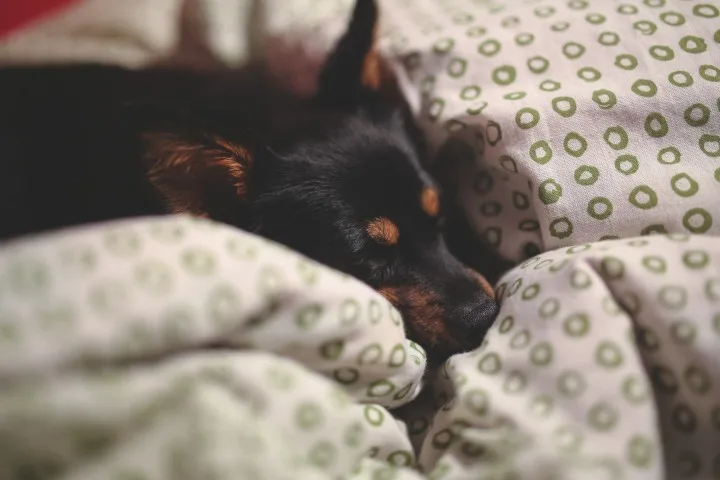 Some dogs decide to nibble on blankets because it is a soothing, repetitive motion. Equate your dog nibbling on a blanket to a baby sucking its thumb.
Some dogs decide to nibble on blankets because it is a soothing, repetitive motion. Equate your dog nibbling on a blanket to a baby sucking its thumb.
Being able to nibble at the blanket mindlessly may be what your dog needs to stay calm.
Nibbling on blankets may help soothe an overly energetic dog, a bored dog, or a stressed and anxious dog. Some dog breeds, like Hounds, are more inclined to chew than other breeds.
Over time, your dog may be accustomed to nibbling on a blanket as a way to keep itself happy and entertained. Soothing behaviors can become addictive for pets, and they can quickly form bad habits.
If you notice your dog self-soothing with a blanket, break this behavior by replacing the blanket with a suitable and safe chew toy option. Not only will a chew toy be less destructive, but it will be healthier and safer too.
Is My Dog Bored?
 A bored dog can be a dangerous dog, which can lead to destructive behaviors at home. Sometimes, nibbling on blankets may simply be a way for a dog to entertain itself throughout the day.
A bored dog can be a dangerous dog, which can lead to destructive behaviors at home. Sometimes, nibbling on blankets may simply be a way for a dog to entertain itself throughout the day.
Chewing is undesirable behavior, but you can prevent this behavior by adequately exercising your dog. Keeping your dog entertained can break a bad blanket-nibbling habit.
Be sure to exercise your dog both mentally and physically. Different breeds of dogs have different exercise requirements and energy thresholds.
If you have a high-energy dog, be sure to give your dog plenty of walks and playtime. For highly intelligent dogs, logic puzzles, obedience training, and exploring new surroundings can help keep your dog entertained.
Is My Dog Anxious?
 If your dog is nibbling on a blanket, it could be a sign of anxiety or stress. Chewing on a blanket displays a repetitive and somewhat soothing behavior.
If your dog is nibbling on a blanket, it could be a sign of anxiety or stress. Chewing on a blanket displays a repetitive and somewhat soothing behavior.
For many dogs, self-soothing behavior is enough to keep them calm through a stressful situation.
It can be challenging to determine if your dog is anxious. Sometimes, multiple signs or symptoms may indicate a stressed dog. Other symptoms of anxiety in your pet can include:
- Barking – Your dog may develop a nuisance and repetitive barking as a way to cope with stress. An anxious dog may bark unnecessarily for long periods.
- Scratching – If your dog is anxious, it may try self-soothing by scratching at furniture or the walls.
- Digging – Your dog may dig inside the house with blankets or carpeting or outside in the yard. This repetitive behavior is soothing for a stressed dog.
- Accidents – Your normally house-trained dog may start to have accidents in your home. Usually, these accidents will occur when you are not at home, indicating possible separation anxiety in your pet.
- Licking – Keep an eye out for repetitive licking or chewing. Your dog may nibble a leg or repeatedly lick a paw. This behavior can be dangerous and can lead to hair loss or even infection.
- Shaking – If you see your dog shaking or shivering, it could be a sign of nerves caused by anxiety. Shaking is an extreme response to stress, but luckily your veterinarian should be able to help with medication to soothe your dog’s nerves.
What Is Separation Anxiety?
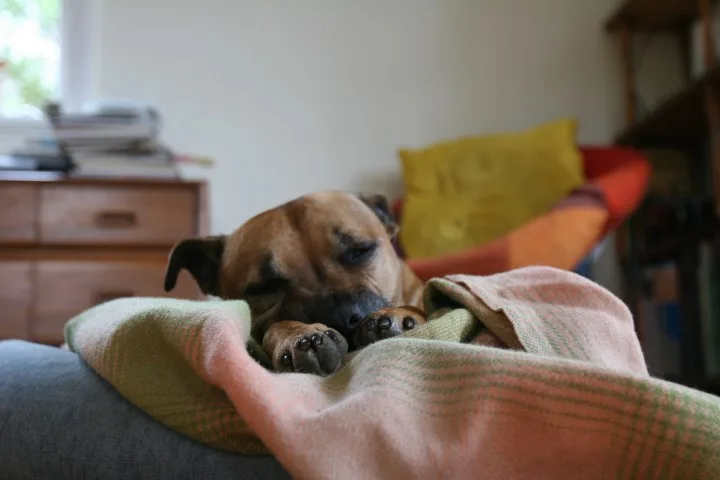 Separation Anxiety is a disorder that dogs can develop when they become too attached to their family.
Separation Anxiety is a disorder that dogs can develop when they become too attached to their family.
A dog will feel stressed when its human leaves the house for an extended period. This disorder can impact all dogs, regardless of size, breed, or age.
Separation anxiety can also develop when your dog forms an attachment to another dog or animal in the home. You may notice separation anxiety develops if one of your pets passes away.
Your dog may display symptoms of separation anxiety in various ways. For some, your dog may develop repetitive behavior, like blanket nibbling, to soothe its stress.
For others, a dog may bark for long periods, dig, or even have accidents in the home, although the dog is house-trained. Separation anxiety exhibits unwanted behaviors that always happen when the owner is not at home.
How Can I Help An Anxious Dog?
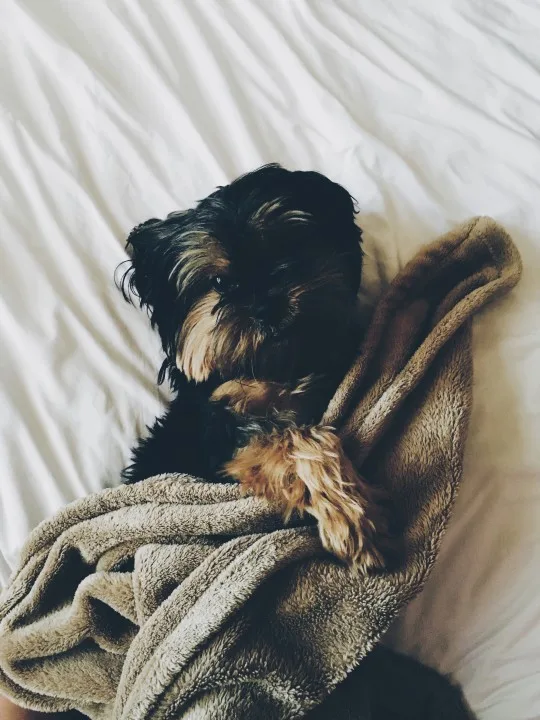
Sometimes, nibbling on blankets is a sign of stress or anxiety in your pet. Different dogs, like people, can feel stress from varying situations.
For some, simply being left alone, away from family, can cause stress. For others, not having enough exercise can trigger a stress response.
To help your dog with anxiety, you need first to consider the root cause of the anxiety. Try to think of any recent routine or environmental changes that could trigger a stress response.
Usually, the start of blanket chewing will coincide with a change.
If possible, eliminate the stressful situation. The solution could mean electing to work from home some days or adding an extra walk into your dog’s day.
Sometimes simply having a radio or television on during the day can provide soothing background noise to ease an anxious pup.
In extreme cases, mild medication may be able to help your dog relax and rest. If your dog is suffering from anxiety, be sure to talk to your veterinarian about possible medication for treatment.
How Can I Stop My Dog From Nibbling Blankets?
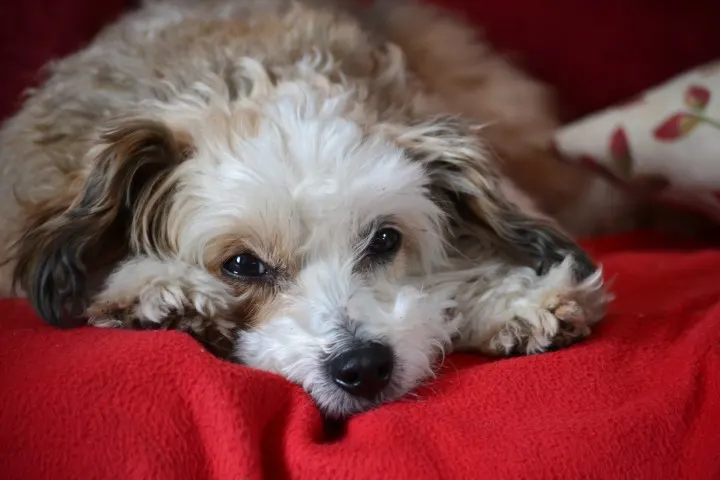 Nibbling the blankets is not a wanted behavior for your dog, so you need to train your dog to stop chewing. When you see your dog nibbling, make a very loud sound or noise to distract your dog.
Nibbling the blankets is not a wanted behavior for your dog, so you need to train your dog to stop chewing. When you see your dog nibbling, make a very loud sound or noise to distract your dog.
You want to get your dog’s attention long enough to distract it and show it a different, more suitable toy to chew. Replace the blanket with a chew toy to teach your dog what is acceptable to chew.
When your pup chews on an acceptable toy, be sure to offer plenty of praise and the occasional treat. With patience and consistency, you’ll be able to teach your dog what is acceptable to chew.
Over time, your dog will stray away from comfort chewing on your blankets and select a safe chew toy instead.
Can Nibbling Blankets Be Dangerous?
While it may seem like nibbling at a blanket is a relatively innocent behavior, it can be dangerous in some cases. If your dog ingests a portion of the blanket, or some errant strings or threads, it can create a recipe for disaster.
Foreign objects can quickly form blockages in the stomach and digestive tract, which can cause infection. In severe cases, a blockage can cause death if not immediately removed.
Chewing on blankets can also lead to chewing on other, more dangerous objects. Chewing behaviors can very easily translate to chewing on hard or sharp objects.
Your dog could easily hurt itself by chewing the wrong object or accidentally ingesting a foreign object. It is important to constantly correct and redirect chewing behavior to keep your dog safe.
Related Questions
Why does my dog scratch at walls?
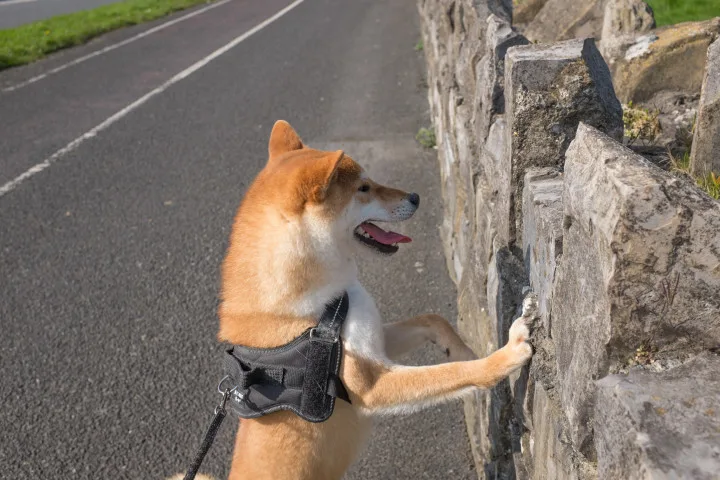 Aside from nibbling on blankets, some dogs will display other undesirable behaviors that can be curious and frustrating to watch.
Aside from nibbling on blankets, some dogs will display other undesirable behaviors that can be curious and frustrating to watch.
Some dogs will scratch at the walls or furniture. While it may be a way for your dog to get your attention, chances are this behavior exhibits a bigger problem.
Your dog may be scratching at the walls because it is bored or nervous. Your dog may need more stimulation throughout the day.
‘Or, scratching at the walls could be a sign that your dog is experiencing separation anxiety.
This diagnosis is most likely the case if you notice your dog scratching when you are not at home. Ongoing training, exercise, and stress management can help reduce this nuisance behavior.
Does my dog enjoy training?
Training is a wonderful way to exercise your dog both mentally and physically. Having a dog properly exercised can help eliminate nervous or anxious energy, leading to nibbling on a blanket or other undesirable behaviors.
When you take your dog to training, you give your dog a chance to burn some energy and learn new behaviors.
Your dog gets to spend time bonding with you and can enjoy new experiences. Most likely, your dog enjoys training and the social aspect involved with training classes.
Our team is composed of pet care professionals, veterinarians, and pet owners. To date, we’ve conducted thousands of hours of research to publish the most accurate pet information.
Most of the writers on our site are vets with 10+ years of clinical experience, ranging from small practice, to equine practice, academia, and surgery. Our goal is to help every pet owner get the information they seek about their dear companions.



Leave a comment
You must be logged in to post a comment.